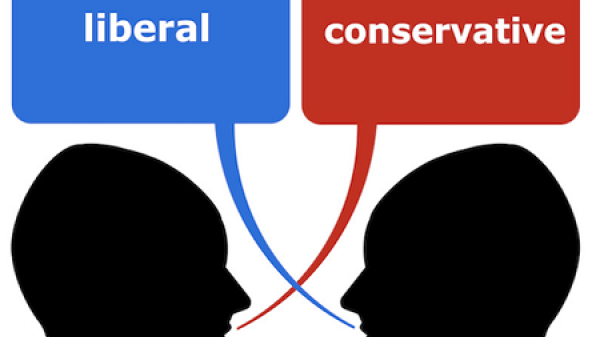Getting Conservatives and Liberals to Act on Climate Change

by Caroly Shumway, Ph.D., Center for Behavior and Climate
How do we as environmental educators motivate people to act, collectively and individually, to counter our climate crisis? Which messages resonate with conservatives, liberals, or both groups?
At the recent Behavior, Energy, and Climate Change conference, I and former Republican Congressman Bob Inglis, Executive Director of RepublicEn, led a Behavior, Energy, and Climate Change (BECC) workshop on just this topic: How to Convince Conservatives and Liberals to Act. Here are eight lessons that we shared:
1. Consider the moral foundation of whom you're talking to. Haidt and Graham (2007) showed that the moral foundations of conservatives and liberals differ, with some overlap. Conservatives hold three morals, called binding morals, most strongly: in-group loyalty, purity/sanctity, and authority/respect. They share two other morals, called individualizing morals, with liberals: fairness/reciprocity and harm/care. However, the individualizing morals do not resonate as strongly with conservatives.
Bob Inglis noted that to increase climate action in conservatives requires helping them find solutions that do fit their values. Reframing with the morals important to a person can increase motivation to act. Feinberg and Willer (2012) found that framing global warming statements as purity increased pro-environmental attitudes among conservatives over any other moral. Kidwell et al. (2013) showed that selective framing with a different message increased pro-environmental behavior in both conservatives and liberals.
2. Consider how a person's worldview affects their response to climate change. According to cultural theory, there are four main worldviews, the set of beliefs that people use to see and interpret the world. As summarized by Xue et al. (2014),
- Hierarchists seek to “maintain existing power structures that protect their interests."
- Individualists value their independence above all else, and support ”free market solutions.”
- Fatalists think that what happens in society is beyond their control.
- Egalitarians care about social injustice, are suspicious of authority, have a high tolerance for social freedoms, and support participatory democracy.
Cultural theory posits that hierarchists and individualists perceive things as threatening if they threaten the status quo: their preferred way of life and structure of social organization (Kahan, 2012). Feygina et al. (2009) framed pro-environmental messages as patriotic, preserving, rather than challenging, the social system. Essentially, framing pro-environmental messages as patriotic eliminated any feeling of threat to the status quo.
3. Actively listen. Think about the contingencies operating in peoples' lives; in other words, the relationship between their behavior and what is reinforcing that behavior. What are people afraid of? Have their family, neighborhood, or community experienced recent change? If you actively listen, and acknowledge, another person's fears, that can make them more receptive to the message that you are trying to impart and reduce intergroup animosity. Listening to opposing views can also increase your own understanding.
4. Find the connection. As the song, "Breakfast at Tiffany's notes:
You say that we've got nothing in common
No common ground to start from....
And I said, "What about Breakfast at Tiffany's?"
She said. " I think I remember the film
And as I recall, I think, we both kind of liked it."
And I said, "Well that's one thing we've got"
Deep Blue Something, 1995
There's always something that you've got in common with the person that you're talking to. Build off of that connection in your climate conversation!
5. Partner with different credible messengers. Presenting arguments from multiple sides to socially influence can reach a broad audience, as people respond to whomever they deem credible. For example, when I worked to conserve wildlife in Papua New Guinea as a senior scientist at the New England Aquarium, I partnered with an Evangelical Christian (the late, great Peter Illyn of Restoring Eden). Peter and I didn't agree on everything. However, we ignored what we didn't agree on, and focused on areas where we did agree—the sound scientific and religious reasons to protect land and wildlife. I focused on the scientific messages; he focused on the religious ones. Together, our shoestring project, Changing Hearts and Minds, reached the hearts and minds of tens of thousands.
6. Watch your tone. There are ways to convey a message to cut across partisan divides. Huddie and Yair (2021) report that Democrats and Republicans alike feel better about each other when their leaders are civil. A useful demonstration of the effectiveness of tone was a recent social media posting urging Covid-19 vaccination that went viral. The tone was not preachy, and the person acknowledged their own limitations of knowledge. Here's an excerpt:
"I'm vaccinated and, no, I don't know what's in it—neither this vaccine, the ones I had as a child, nor in the Big Mac, or in hot dogs, or in other treatments…whether it's for cancer, AIDS, the one for polyarthritis, or vaccines for infants or children. I trust my doctor when he says it’s needed. I also don't know what's in Ibuprofen, Tylenol, or other meds, it just cures my headaches & my pains ...There's a lot of things I don't know and never will…
I just know one thing: life is short, very short, and I still want to do something other than just going to work every day or staying locked in my home... I'm vaccinated, not to please the government but:
- To not die from Covid-19.
- To NOT clutter a hospital bed if I get sick.
- To hug my loved ones...
- To live my life.
- To have my kids/grandkids go back to school and play sports....
- To protect us."
7. Encourage social labeling. Help people think of themselves as a member of a pro-climate ingroup already. It doesn't have to be labeled as such. For example, noting that people already care about ensuring clean drinking water for their families helps people to support addressing water pollution by advancing renewable energy. Mannetti et al. (2004) demonstrated that self-labeling as a typical recycler predicted recycling behavior above all other variables. Commercon et al. (2021) showed that Republicans listening to a single 90-second radio story by Republicans discussing climate change concerns or actions significantly increased their own perception of the social norm that Republicans as a group worried about global warming.
8. Adopt a big tent approach to climate solutions. You may believe that government regulation is the way to go; your conservative friend or colleague may believe that a private-sector approach is best. As climate scientists have determined that significant climate action needs to take place this decade to prevent a climate catastrophe (Intergovernmental Panel on Climate Change, 2021), it's clear that we just don't have the time for bickering anymore. All strategies should be considered and negotiation should be encouraged.
In sum, there are ways, even in this partisan world we are living in, to reach across the aisle. Respecting one another's differences while trying to find similarities goes a long way.
----------------------------
Dr. Caroly Shumway is the Director of the Center for Behavior and Climate (CBC). The tips noted here and other behavioral lessons are included in the Center for Behavior and Climate's free online course: Behavior Change for Climate Action. Or you can sign up for CBC's free monthly newsletter here.

Comments
Thanks for sharing these insights Caroly!